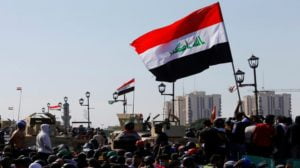Why Iran wants the Lebanon and Iraq uprisings to fade
Why Iran wants the Lebanon and Iraq uprisings to fade
When the 2011 Arab Spring swept across the Middle East, Iran’s leadership embraced the revolutions as an Islamic Awakening, with the notable exception of Syria where Tehran saw the demonstrations as a grave threat to its security and relationship with its sole regional ally.

This year the Middle East is arguably experiencing an “Arab Spring 2.0”. Protests have erupted in Algeria, Iraq, Lebanon, and Sudan—all of which managed to mostly weather the first wave of Arab uprisings in 2011. This time around, Tehran is not welcoming the mobilization of anti-government protestors demanding fundamental reforms in countries where the Islamic Republic has spent many years investing its political and economic capital. The unrest in Iraq and Lebanon has been extremely problematic for Iranian interests as these two countries are critical to Tehran’s geopolitical position in the Middle East.
In Iraq, Prime Minister Adil Abdul-Mahdi is facing popular protests stemming from the dire economic situation, lack of basic services, and corruption in the country. Meanwhile, in Lebanon plans to tax the messaging application WhatsApp to make up for the government’s fiscal deficit brought many to the streets, eventually forcing Prime Minister Saad al-Hariri to resign. Ultimately, this announced tax was the straw that broke the camel’s back following decades of corruption, economic mismanagement, nepotism, and state negligence on the part of Lebanon’s political ruling class.
Iran’s reaction to the “Arab Spring 2.0” however, has been fundamentally different. Late in October, Supreme Leader Ayatollah Ali Khamenei warned that “arrogant powers—above all, the US—and western intelligence services are creating chaos in some of our neighboring regional countries with money from some reactionary countries in the region.” As Iran’s Supreme Leader sees it, these actors seek to drive a wedge between two Shia power centers: Tehran and Baghdad. He also called on protestors to seek their “legitimate” demands through legal structures. Reports further indicate that Iran secretly dispatched Islamic Revolutionary Guard Corps Quds Force Commander Qassem Soleimani to Iraq, urging Baghdad to quell the protests; Soleimani had further called on Shia groups to continue supporting Prime Minister Abdul-Mahdi.
Tehran has vested strategic interests in Iraq and Lebanon’s political orders being Iran-friendly, as they remain critical in countering the influence of the US, Israel, Saudi Arabia, and other regional actors. The future and stability of Iraq has historically been critical to Iran’s security interests. First, Iran seeks to prevent the re-emergence of Iraq as a threat. The horrible experiences of the bloody eight-year conflict with Saddam Hussein during the 1980s compels Iran to ensure that its friends remain in power in Baghdad. Furthermore, a friendly Iraq can act as a buffer zone between Iran and its chief regional rival, Saudi Arabia, whereas a pro-Saudi government in Iraq could heavily tilt the balance of power in favor of Riyadh.
—
Read more at: Atlantic Council
Iran Briefing | News Press Focus on Human Rights Violation by IRGC, Iran Human Rights

